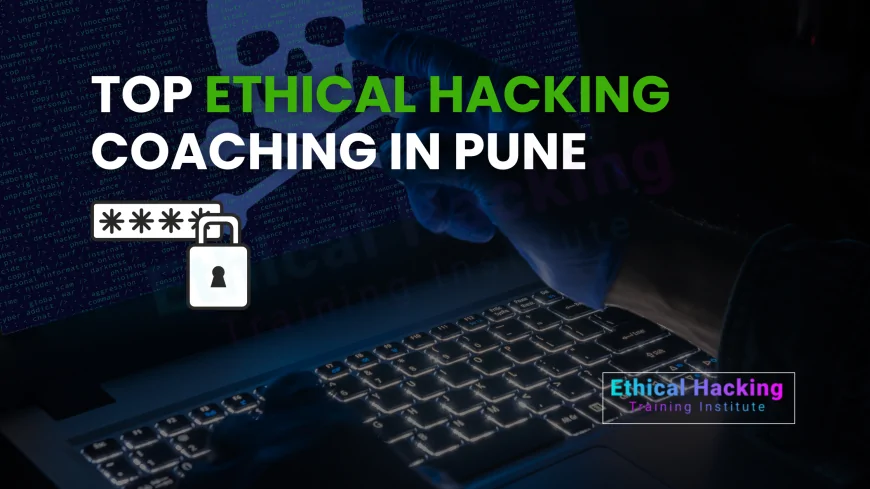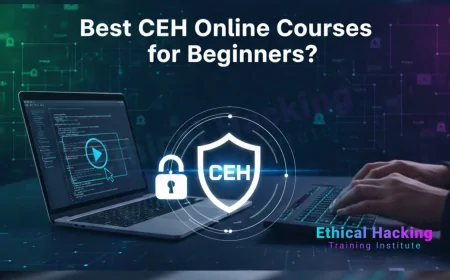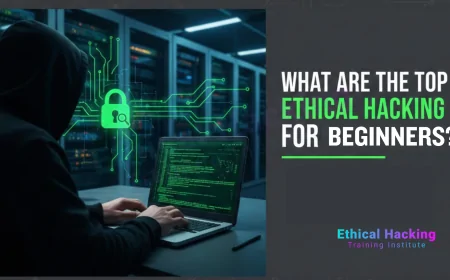Best Ethical Hacking Coaching Centers in Pune | 2025 Training Guide
Discover how to find the best ethical hacking coaching centers in Pune with this complete 2025 guide. Learn what to look for in course quality, hands-on labs, certification prep, and career support—without relying on institute names.

In the digital age, the demand for ethical hackers and cybersecurity professionals is booming. As companies grow increasingly reliant on digital systems, the need to protect data, infrastructure, and privacy becomes critical. Pune, being one of India's fastest-growing tech hubs, has responded to this demand with a surge in ethical hacking coaching centers.
But with so many options, how do you identify the best ethical hacking coaching center in Pune? This blog gives you a comprehensive guide to what makes a coaching center exceptional—so you can make a smart, career-shaping decision without relying on name recognition alone.
Why Ethical Hacking Matters in 2025
Before diving into how to choose the right coaching center, it's important to understand the growing significance of ethical hacking:
-
Cybercrime is rising—so is the need for ethical professionals to combat it.
-
Governments and businesses are investing heavily in cybersecurity.
-
Ethical hackers are highly paid and respected in the tech world.
-
Certifications and real-world skills are now crucial to stand out.
So, the question isn't whether you should pursue ethical hacking—it's where you should begin your journey in Pune.
How to Identify the Best Ethical Hacking Coaching Centers in Pune
Here’s a breakdown of the most crucial criteria to look for when evaluating a coaching center:
1. Curriculum Depth and Industry Relevance
A top-tier coaching center goes beyond the basics. It teaches ethical hacking not as a theoretical subject, but as a dynamic, ever-evolving practice.
Look for centers that offer:
-
Coverage of real-world cyber attacks and defense strategies.
-
Updated curriculum aligned with CEH (Certified Ethical Hacker) or CompTIA Security+ standards.
-
Training in penetration testing, vulnerability assessment, network security, cloud security, and cyber forensics.
-
Inclusion of practical labs, capture-the-flag (CTF) exercises, and simulated attack environments.
2. Trainer Expertise and Credentials
Great content is nothing without great delivery. The expertise of instructors significantly influences your learning experience.
A quality coaching center should offer:
-
Trainers with industry certifications (e.g., CEH, CISSP, OSCP).
-
Professionals with real-world hacking or cybersecurity experience.
-
A teaching approach that combines hands-on examples with live case studies.
-
Guest sessions or masterclasses by ethical hackers from the field.
3. Hands-On Lab Access
Ethical hacking isn’t something you just read about—it must be practiced regularly in a controlled environment.
Evaluate whether the coaching center provides:
-
24/7 access to virtual labs for remote learners.
-
Realistic lab environments with tools like Kali Linux, Metasploit, Burp Suite, Wireshark, and Nmap.
-
Challenges or scenarios mimicking real-time security breaches.
Hands-on learning is the difference between memorizing theory and becoming a skilled ethical hacker.
4. Certification Preparation Support
Certifications matter in cybersecurity—they validate your skills and help you stand out in job applications.
The best coaching centers will:
-
Align their syllabus with top certifications like CEH, CompTIA Security+, OSCP, or CHFI.
-
Offer mock exams, practice questions, and personalized feedback.
-
Guide students on exam strategies, application processes, and recertification when needed.
5. Placement Assistance and Internship Opportunities
The end goal for most learners is employment or freelancing opportunities in the cybersecurity field. A quality coaching center recognizes this.
Check for:
-
Strong placement support with dedicated HR assistance.
-
Internship tie-ups with startups, IT firms, or cybersecurity consultancies.
-
Resume building, mock interviews, and portfolio reviews.
-
Alumni success stories showing real outcomes.
6. Learning Flexibility (Online + Offline Options)
In 2025, flexibility is essential. The best coaching centers offer both online and offline learning options to suit your schedule.
Look for:
-
Hybrid learning models—attend in-person when you can, learn online when needed.
-
Access to recorded sessions for revision or self-paced learning.
-
Interactive live sessions with Q&A, group discussions, and community forums.
7. Community and Networking Opportunities
An often-overlooked factor is the community the coaching center fosters.
Consider whether they:
-
Encourage participation in CTF competitions, bug bounty programs, and hackathons.
-
Have a strong alumni network or private cybersecurity community.
-
Offer lifetime access to forums, discussion boards, or Slack/Discord groups.
-
Bring together guest speakers, researchers, and ethical hackers for events.
8. Post-Course Support and Mentorship
Learning ethical hacking doesn’t stop after the course ends. You’ll need continued support to grow.
Look for coaching centers that offer:
-
Mentorship programs to guide you through your early career.
-
Access to updated learning resources as tools and techniques evolve.
-
Ongoing support for certification renewal, advanced learning paths, and freelancing guidance.
9. Transparent Pricing and Value for Money
High fees don’t always mean high quality. The best centers are transparent about what you're paying for.
Ensure the coaching center:
-
Offers clear breakdowns of course fees and what's included.
-
Provides EMI options, scholarships, or discounts without hidden charges.
-
Justifies the cost with high-quality training, career support, and certification guidance.
10. Student Feedback and Reputation
Finally, check what past learners have to say. Even if you can’t rely on big brand names, student reviews reveal the truth.
You can:
-
Read testimonials, ratings, and reviews on neutral platforms.
-
Join local Pune-based tech communities or forums for personal recommendations.
-
Ask to connect with past students via LinkedIn or discussion groups.
Common Red Flags to Avoid
Not all coaching centers live up to their marketing. Here are some warning signs:
Overemphasis on theory with little practical work.
Trainers without any real-world cybersecurity background.
Vague course content and no demo classes offered.
No community, internships, or placement assistance.
High fees without any certification or mentorship support.
Be vigilant. Your investment—both time and money—deserves quality.
Career Pathways After Completing an Ethical Hacking Course
After training from a reputable coaching center, you can pursue roles like:
-
Ethical Hacker / Penetration Tester
-
Cybersecurity Analyst
-
Security Consultant
-
Incident Responder
-
SOC (Security Operations Center) Analyst
-
Bug Bounty Hunter / Freelancer
You can also specialize further in areas like:
-
Cloud Security
-
Digital Forensics
-
Malware Analysis
-
IoT and Mobile Security
FAQ's
1. What is the scope of ethical hacking in Pune?
Ethical hacking has a growing demand in Pune due to its thriving IT and cybersecurity sector. With numerous tech companies and startups based in the city, professionals with ethical hacking skills are increasingly sought after to secure digital infrastructures and prevent cyber threats.
2. How do I choose the best ethical hacking coaching center in Pune?
Look for a center with updated curriculum, hands-on lab access, certified trainers, placement assistance, and strong student feedback. Ensure the program includes practical exposure and aligns with industry certifications like CEH, CompTIA Security+, or OSCP to maximize your career opportunities.
3. Are ethical hacking courses in Pune suitable for beginners?
Yes, many ethical hacking courses in Pune are designed for beginners. They start with cybersecurity basics, networking concepts, and gradually move into tools, attack techniques, and real-time simulations to ensure foundational learning before advancing to complex scenarios.
4. What certifications are included in ethical hacking training in Pune?
Leading coaching centers typically prepare students for globally recognized certifications like CEH (Certified Ethical Hacker), CompTIA Security+, CHFI (Computer Hacking Forensic Investigator), and sometimes OSCP (Offensive Security Certified Professional), depending on the course level and duration.
5. What are the career opportunities after completing an ethical hacking course?
Post-training, you can pursue roles such as Ethical Hacker, Penetration Tester, SOC Analyst, Cybersecurity Consultant, or Security Auditor. Some professionals also choose freelance bug bounty hunting or digital forensics, depending on their specialization and certifications.
6. Do coaching centers in Pune offer hands-on ethical hacking training?
Yes, reputable coaching centers emphasize practical training using labs, real-world attack simulations, penetration testing tools, and capture-the-flag (CTF) challenges. Hands-on practice is a key factor in building real-world ethical hacking skills.
7. Is ethical hacking training in Pune available online?
Most coaching centers in Pune now offer flexible online learning options. These include live virtual sessions, recorded classes, remote lab access, and real-time support to help students learn ethical hacking remotely while maintaining practical engagement.
8. How long does an ethical hacking course in Pune typically take?
Course durations vary depending on depth. Beginner to intermediate programs typically last 2–3 months, while advanced certification training like CEH or OSCP may extend to 4–6 months, especially if combined with internships or project work.
9. What skills are needed to start learning ethical hacking?
Basic computer knowledge, understanding of operating systems (especially Linux), networking concepts, and curiosity about cybersecurity are ideal starting points. Some courses also provide a foundation in programming languages like Python or Bash scripting.
10. Do ethical hacking coaching centers in Pune offer placement support?
Yes, many coaching centers provide dedicated placement assistance including resume building, interview preparation, internship opportunities, and direct referrals to cybersecurity firms, startups, and IT companies operating in and around Pune.
11. Can ethical hacking be self-learned instead of joining a coaching center?
While self-study is possible, coaching centers provide structured learning, mentorship, practical exposure, and certification preparation—factors that are difficult to replicate independently. They also accelerate learning through guided labs and community support.
12. Are there ethical hacking courses in Pune with internship opportunities?
Yes, several coaching centers collaborate with local IT firms and cybersecurity consultancies to offer internship programs. These internships provide real-time experience with network scanning, vulnerability assessment, and system hardening.
13. What tools are commonly taught in ethical hacking training?
Courses typically cover tools like Kali Linux, Nmap, Wireshark, Burp Suite, Metasploit, John the Ripper, Aircrack-ng, and Nessus. These tools help in network scanning, penetration testing, vulnerability exploitation, and system forensics.
14. Is ethical hacking a good career choice in 2025?
Absolutely. With cyber threats escalating globally, ethical hackers are in high demand across industries. In 2025, certified professionals are likely to enjoy competitive salaries, flexible work environments, and continuous career growth.
15. Do Pune-based coaching centers offer weekend or evening batches?
Yes, many centers accommodate working professionals and students with flexible timings including weekend and evening batches. This allows learners to balance their training with academic or job responsibilities effectively.
16. What topics are covered in a typical ethical hacking course in Pune?
Core topics include network security, system hacking, cryptography, malware analysis, web application security, wireless attacks, social engineering, and digital forensics. The course typically culminates in real-world projects and certification readiness.
17. How much does ethical hacking training cost in Pune?
Costs vary depending on course level and inclusions, but most comprehensive programs range between ₹25,000 and ₹70,000. Online or fast-track options may differ in pricing. Look for value in mentorship, lab access, and certification prep.
18. Are there fast-track ethical hacking courses in Pune?
Yes, some coaching centers offer fast-track ethical hacking programs that cover essential concepts and tools within 4–6 weeks. These are ideal for professionals or students seeking quick, intensive skill-building before certifications.
19. What are the benefits of ethical hacking training for IT professionals?
For IT professionals, ethical hacking training enhances security awareness, boosts their ability to defend systems, and opens doors to advanced roles in cybersecurity. It adds a valuable specialization to networking, development, or system admin backgrounds.
20. Can non-technical students join ethical hacking coaching centers in Pune?
Yes, non-technical students can enroll, provided the course includes foundational modules in networking and system basics. Coaching centers often start with beginner-friendly sessions to build up the necessary technical background.
Your Cybersecurity Career Starts in Pune
Choosing the right ethical hacking coaching center is the first step to a rewarding career in cybersecurity. Pune is brimming with opportunities—but only the right guidance will help you stand out in a competitive market.
Focus on value, hands-on practice, mentorship, and career outcomes—not just names or flashy marketing.
What's Your Reaction?
 Like
0
Like
0
 Dislike
0
Dislike
0
 Love
0
Love
0
 Funny
0
Funny
0
 Angry
0
Angry
0
 Sad
0
Sad
0
 Wow
0
Wow
0
















